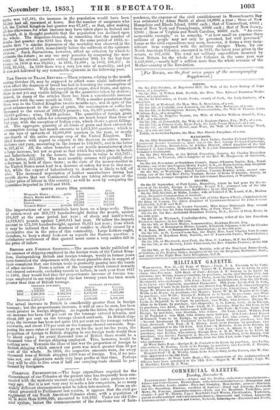COLONIAL Exrrxnrrrax.-The large expenditure required for the Goveriiment of our
Colonies at the present time has frequently been con- trasted with the moderate amount expended for the same purpose a cen- tiny, ago. But it is not very easy to make a fair comparison, as so many Widery different circumstances must be taken into account. From an ab- s*" presented to Parliament last session, it appears that the civil go- l'Alainent of our North American Colonies alone, with a population of lit le,than 2,000,000, amounted to 146,152/. Under our old Cobo- l:6W elgOn before the commencement of the American war of Inde- pendence, the expense of the civil establishment in Massachusetts Bay was estimated by Adam Smith at about 18,000k a year ; those of New Hampshire and Rhode Island, 35001. each ; that of Connecticut, 40001. ; those of New York and Pennsylvania, 45001. each ; that of New Jersey, 12001. ; those of Virginia and South Carolina, 80001. each. "An ever- memorable example," as ho remarks, " at how small an expense three millions of people may not only be governed, but well governed." Large as the civil expenditure may seem, however, it forms a very insig- nificant item compared with the military charges. These, for our North American Colonies, amounted in 1S51, the latest year given in the return, to 597,4191. The total net military expenditure incurred by Great Britain for the whole of her Colonies in the same year was 2,449,8691.,-nearly half a million more than the whole revenue of the Mother-country at the Revolution.


































 Previous page
Previous page